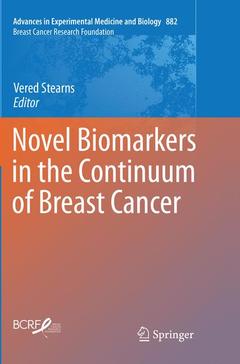Description
Novel Biomarkers in the Continuum of Breast Cancer, Softcover reprint of the original 1st ed. 2016
Breast Cancer Research Foundation Series
Coordinator: Stearns Vered
Language: English
Subject for Novel Biomarkers in the Continuum of Breast Cancer:
Novel Biomarkers in the Continuum of Breast Cancer
Publication date: 04-2018
Support: Print on demand
Publication date: 04-2018
Support: Print on demand
Novel Biomarkers in the Continuum of Breast Cancer
Publication date: 03-2016
Support: Print on demand
Publication date: 03-2016
Support: Print on demand
Description
/li>Contents
/li>Biography
/li>Comment
/li>
This volume provides a comprehensive review of established and novel biomarkers across the continuum of breast cancer. The volume covers topics related to breast cancer risk and prevention, prediction of response to today?s standard therapies, and markers capable of influencing treatment decisions in the near future. Chapter authors combine their wide-ranging expertise to review the current status of the biomarker and to offer their individual perspectives on how biomarkers may be used in future treatments and research.Breast cancer continues to be the most common malignancy diagnosed in women in the Western world. While there are multiple treatment approaches for breast cancer, today more than ever we recognize that each tumor is unique. The challenge ahead is to consider how to best use validated and novel biomarkers to select the most appropriate treatment(s) for individual patients.
1 Genomic Biomarkers for Cancer Risk.- 2 Epigenetic Biomarkers of Breast Cancer Risk: Across the Breast Cancer Prevention Continuum.- 3 Incorporating Biomarkers in Studies of Chemoprevention.- 4 Breast Molecular Profiling and Radiotherapy Considerations.- 5 Prognostic and Predictive Biomarkers of Endocrine Responsiveness For Estrogen Receptor Positive Breast Cancer.- 6 Biomarkers for predicting response to Anti-HER2 Agents.- 7 Intratumor Heterogeneity in Breast Cancer.- 8 Intratumor Heterogeneity in Breast Cancer.- 9 Pharmacogenetic Predictors of Response.- 10 Metabolomics in Breast Cancer: Current Status and Perspectives.- 11 Circulating Tumor Cells.- 12 Circulating Plasma Tumor DNA.
Vered Stearns is a Professor of Oncology and the Co-Director of the Breast and Ovarian Cancer Program at the Sidney Kimmel Comprehensive Cancer Center, Johns Hopkins School of Medicine, where she also holds the Breast Cancer Research Chair in Oncology. Dr. Stearns is an expert in novel drug investigation—her long-term research goal is to improve current therapies by individualizing strategies for the treatment and prevention of breast cancer. Her main research includes utilization of biomarkers to predict response to standard regimens used to treat and prevent breast cancer and to introduce new treatments. While administering standard chemotherapy in the preoperative setting, Dr. Stearns examines molecular markers and functional imaging to assist in the early determination of sensitivity or resistance to different treatments. Dr. Stearns and colleagues from the Consortium On Breast Cancer Pharamcogenomics (COBRA) were the first to evaluate the role of genetic variants in candidate genes such as CYP2D6 in tamoxifen metabolism, safety, and efficacy. The work has been extended to evaluate the role of genetic variants in aromatase inhibitor-associated outcomes. Dr. Stearns, who received numerous grants and awards to fund her innovative research, was a recipient of early career awards, including a Clinical Research Training Grant from the American Cancer Society, and was one of the first five recipients of the prestigious Damon Runyon Clinical Investigator Award. Subsequently, she was the inaugural recipient of the American Society of Clinical Oncology’s Advanced Clinical Research Award. She is an Editorial Board Member of Clinical Cancer Research, Breast Cancer Research and Treatment, and ONCOLOGY. Dr. Stearns’ work has been presented in key national and international meetings. She has published more than 150 scientific publications, which have been cited extensively.
Explores the latest research on genetic and epigenetic biomarkers in breast cancer Discusses metabolic pathways in predicting treatment response in breast cancer Covers the implications of circulating tumor cells, circulating DNA, and tumor heterogeneity in breast cancer research and therapy Includes supplementary material: sn.pub/extras
© 2024 LAVOISIER S.A.S.




